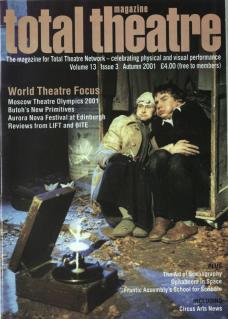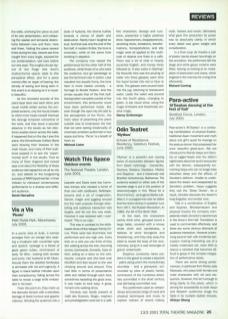Mythos is a powerful and moving series of encounters between figures from Greek mythology – Cassandra, Orpheus, Oedipus, Daedalus, Medea and Sisyphus – and a historically real Brazilian revolutionary, Barbarosa. The audience seated on either side of the traverse stage is put in the position of observer/judges in this ‘Ritual for a Short Century', as Eugenio Barba subtitles it. In a programme note he states that the short century in question runs from 1917, the Russian Revolution, to 1989, the fall of the Berlin Wall.
At the start, the characters calmly drink wine, grouped round a large table, covered with a snowy white cloth and candelabra, a tableau at once bourgeois and threatening, until they strip away the table to reveal the body of the revolutionary, lying on a vast rectangle of gravel underneath.
Sisyphus constantly rakes patterns in the gravel to create a labyrinth – paths along which the revolutionary stumbles – and a graveyard, surrounded by piles of plastic hands, reminiscent of the numerous atrocities committed in the short century, and still being committed now.
The performers used an extraordinary and precise range of vocal and physical techniques and music to explore notions of recent history, myth, heroes and revolt. Ultimately what gave this production its power was its absolutely clarity, in which every detail was given weight and consideration.
In a final coup de théâtre a pair of plastic hands played hauntingly on the accordion, the performers left the stage and white gauze curtains were lifted, leaving us looking at an installation of destruction and chaos, which lingered in the memory for a long time afterwards.

